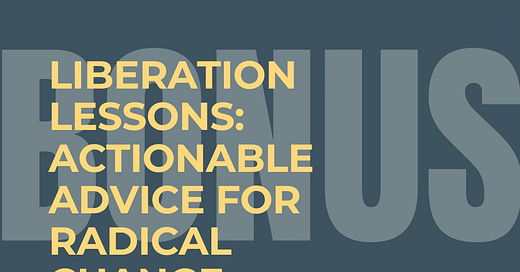How do I raise an anti-racist, anti-sexist white son? Feminist Advice Friday collaboration with Zawn Villines
Liberation Lessons: Actionable Advice for Radical Change A Weekly Paid Subscriber Bonus
How do I raise an anti-racist, anti-sexist white son? Feminist Advice Friday collaboration with Zawn Villines of
A Reader Asks…
I am the mother of a beautiful, blonde-haired, pale-skinned, 4 year-old boy. We are native English speakers and are middle/upper-middle class. I am so terrified that my boy will grow up to be another link in the chain of privilege entitlement that perpetuates misogyny, racism, and classism. (He spends 2 days a week with his father--who will not look at his own privilege--and the rest of the time is with me.) I talk to him about skin color, because it is a privilege we share, but I’m stuck on how to talk about other types of privilege, especially gender (a privilege he gets that I don’t. He's so little and just wants to be a kid, but I want to instill values in him that we notice our privilege and spread it to others when we can. How do I parent my little white boy the values of identity justice?
Desiree’s answer
Dear Reader,
First, I want to acknowledge and thank you for the crucial work you are stepping into by bearing witness to systemic oppression and recognizing your role in dismantling it. It’s not easy to hold this awareness, especially when it comes to parenting, but your desire to raise a child grounded in justice is already a powerful act of resistance. I can feel the love and deep care you have for your son, and I want to stress that the work you’re doing is not just about saving the world from him becoming another link in the chain—it’s about co-creating a new, liberated world with him.
Let’s start with the most important thing: Your son already holds a position within these
systems of oppression. The question isn’t whether he will become an oppressor, but
recognizing that he already is born into a system that confers power upon him based on race, gender, and class. Systems of whiteness and patriarchy are non-consensual—they affect us whether we like it or not. And the work, for both you and him, is to dismantle these systems from the inside.
By understanding that he’s already positioned in a place of privilege, your role as a parent shifts from trying to prevent him from participating in harmful systems to helping him see them, question them, and choose to act differently. You can help him understand the weight of this responsibility, not in a way that induces guilt or shame, but in a way that nurtures accountability and compassion.
Key Shifts in Approach:
1. From Savior to Co-Creator:
Raising your son to be an ally is important, but raising him to be a co-creator of a more just world is even more critical. When we move from a place of trying to “save” others to standing alongside them, we dismantle the idea of a savior complex that is rooted in supremacy. This gives him the chance to be part of a community that values shared liberation.
2. Understanding the Weight of Being an Oppressor:
It’s key that your son grows up understanding that these systems already shape him.
The work is not to avoid being complicit in oppression but to actively resist it. This is a lifelong process, and by modeling this for him, you set the foundation for sustainable activism. He will learn that these conversations don’t end when he’s older; they evolve with him.
3. Privilege vs. Leverage:
I see that you already talk to him about skin color, and that’s a powerful start. What you can also introduce is the idea of leveraging privilege—not just noticing it.




